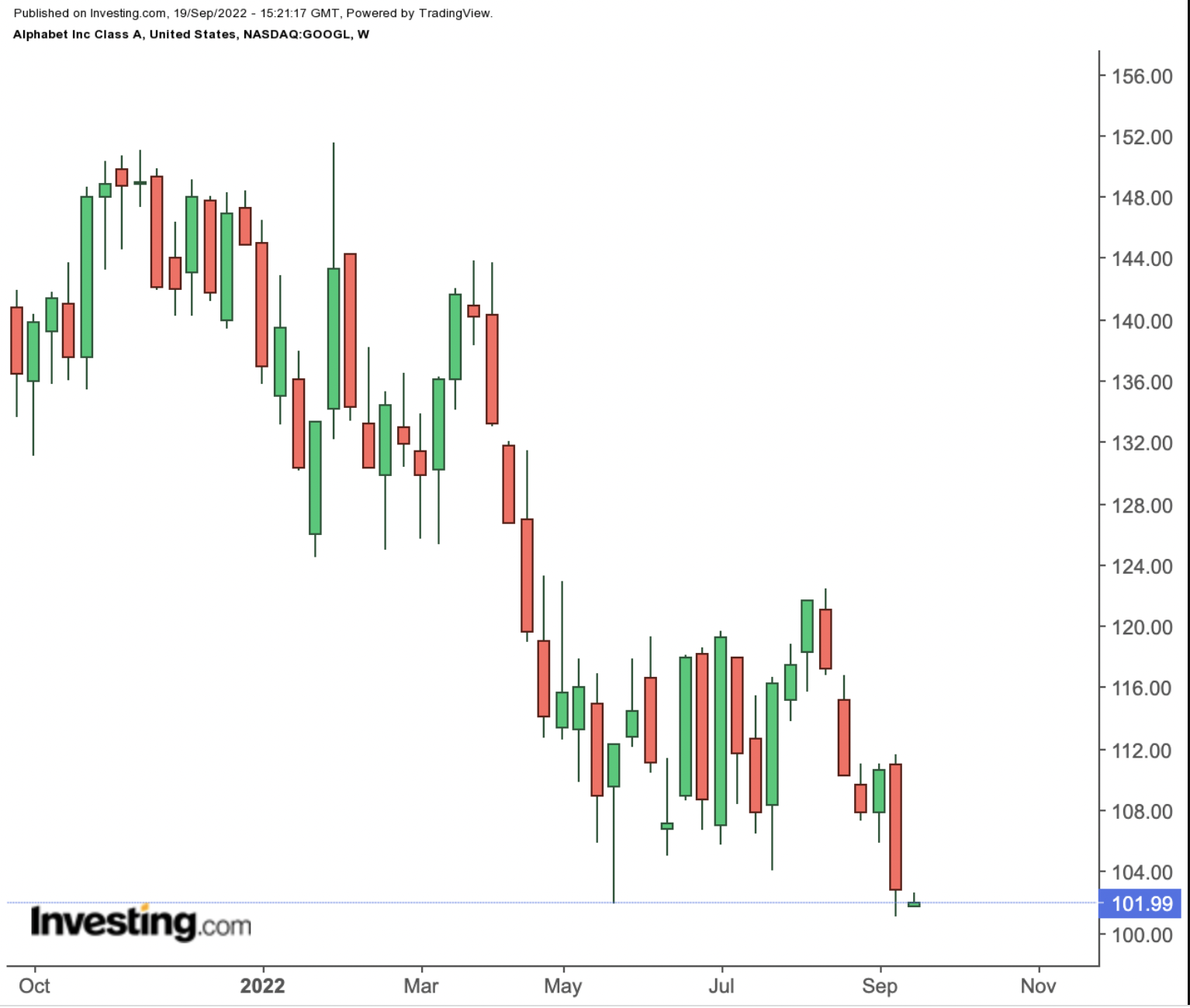- Down 28% so far this year, GOOG looks like a clear buying opportunity
- But given external dynamics, the case isn’t quite that simple
- Long term, the stock will be fine. But GOOG isn’t the ‘slam dunk’ it appears to be right now
On its face, there seems to be an absolutely ironclad case for buying Alphabet (NASDAQ:GOOGL) (NASDAQ:GOOG). One of the world’s best businesses has seen its stock price drop 28% this year, and the decline could be seen as a significant overreaction from a nervous market.

Source: Investing.com
After all, GOOG now looks exceptionally cheap. Backing out roughly $18 per share in cash on the balance sheet (net of debt), the stock trades at less than 17x the consensus earnings per share estimate of $5.13. But even that understates the case.
Alphabet is not just Google. It also includes Google Cloud and a group of companies known as “Other Bets.” That latter group includes, most notably, autonomous driving startup Waymo, along with Verily, a health research organization.
Google Cloud and Other Bets have value but, at the moment, are losing money. The core business — referred to as “Google Services,” including search, YouTube and Android — is printing money. Over the past four quarters, Google Services has generated $96 billion in operating income.
At a 16.2% tax rate (Alphabet’s tax rate in both 2020 and 2021), that’s $80 billion in net income, or more than $6 per share. Looking solely at the core business, and backing out net cash, Alphabet stock is trading for roughly 13 times earnings. And that figure doesn’t include Waymo, Verily and other investments, all of which have real value despite being currently unprofitable.
Were Alphabet just Google Services, bulls would argue there is no way the market would price that business at just 13x earnings. But, in fact, that argument might well be incorrect.
The Margin Risk for Google
In 2018, Google Services generated $43.1 billion in operating income, or 33.0% of its revenue. In 2021, Google Services operating profit was $91.9 billion, or 38.7% of revenue.
That multi-year performance is impressive. But the question for Alphabet is whether it’s sustainable. In 2021, in particular, business boomed: Services revenue rose 41%, and operating profit soared 68%.
The year 2021 was perhaps the best possible environment for online advertising. Startups in multiple industries were competing heavily for keywords. Teladoc Health (NYSE:TDOC) is among the companies that cited Google advertising costs as pressuring their own margins.
Consumers were flush. Businesses focusing on their e-commerce strategies were spending heavily to attract those customers. Google Services is a great business, yes, but the 2021 performance was driven more by a positive external environment than any specific strategies the company executed.
In other words, it certainly looks like Google Services was a so-called “pandemic winner.” And it looks like both its earnings and, importantly, its profit margins were at a peak. We’ve already seen a reversal in the second quarter: Services revenue increased just 10% and operating profit grew a paltry 2%.
If margins return to pre-pandemic levels, that alone is a roughly 15% headwind to earnings growth. If the global economy — and Alphabet gets more than half its revenue from outside the U.S. — stalls out, revenue may decline as well.
That risk is why the market is pricing GOOG stock as it is. To be sure, the market is not necessarily correct. But there’s a logic behind this sell-off beyond rattled investors simply selling amid Federal Reserve rate hikes and other broader concerns.
Google Needs To Win Elsewhere
That’s the concern in the core business. The worry is that the rest of the business hasn’t really performed that well.
Alphabet is investing heavily in the segments outside Google Services. Over the past four quarters, Google Cloud and Other Bets have posted losses of roughly $9 billion. But those investments haven’t yet paid off.
Google Cloud is far behind both Amazon.com (NASDAQ:AMZN) and Microsoft (NASDAQ:MSFT) in market share. Waymo is facing competition from Tesla (NASDAQ:TSLA), General Motors (NYSE:GM) and many others. Waymo has made progress, but hasn’t yet posted a signature achievement.
Google’s hardware business, whether in smartphones, streaming devices or Nest, hasn’t moved the needle. Project Loon, which aimed to provide high-speed internet via balloons, was shut down. Google Fiber still has a relatively small footprint.
Even with the cyclical risk to the core advertising revenues, there’s a fundamental argument that investors in Alphabet are getting the rest of the business “for free,” or something close. But until the rest of the business shows it can create value that’s material against a $1.3-trillion market cap, that argument feels a bit thin.
To be clear, this does not mean that GOOG is a short, or that it can’t bounce off support just above $100. And it doesn’t mean that GOOG won’t rise over the long term. This remains a great business; competition in core search is way behind, even if TikTok is threatening the cash cow that is YouTube.
Rather, the point is that the sell-off here isn’t mindless. There are real risks here, and a real possibility that Google earnings are at a multi-year peak. If that is the case, Alphabet stock might look cheap now, but it won’t look as cheap a year from now.
Disclaimer: As of this writing, Vince Martin is short Tesla. He has no positions in any other securities mentioned.
